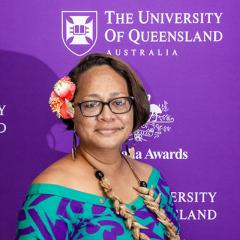Researchers from The University of Queensland recently returned from Germany, where they explored the future of biotechnology with some of Europe’s leading scientists.
Hosted by the Technical University of Munich (TUM), the ‘Research Symposium on Biotechnology for Food and Chemicals’ provided a platform to discuss advances in the biological sciences, and how Australia and Germany could progress into a cleaner, greener, and healthier future.
School of Chemistry and Molecular Biosciences (SCMB) Professor Gary Schenk said the event was characterised by a mutual motivation to establish long-term multidisciplinary projects in areas of urgency for the global ‘bioeconomy’ – the sustainable production and conversion of biomass into industrial products and energy.
He presented a keynote address on the role of pesticides and nerve agent-degrading enzymes in remediation and anti-warfare strategies.
“The symposium served as a roadmap to outline our joint endeavours for the next few years, and the participants strongly supported a proposed biannual event to monitor and develop milestones,” Professor Schenk said.
“This partnership will undoubtedly lead to major advances in technologies relevant to the bioeconomy of the 21st century.”
The event was held in Weihenstephan Abbey, what is thought to be the world’s oldest continuously operating brewery and is now part of TUM’s School of Life Sciences.
“This historic site is the nucleus for biotechnological research in the region, and what better place to discuss how the application of biotechnology can take global industries into the new energy future.”
Harnessing the momentum of the TUM event, the universities will come together again for the ‘UQ-TUM Bioeconomy Symposium’ in Brisbane from 4-6 October, when participants will unpack the impact of biotechnology on the economy of the future.
UQ will also formally welcome two lead TUM collaborators as Honorary Professors: Professor Michael Rychlik (Chair of Analytical Food Chemistry) and Professor Volker Sieber (Chair of Biogenic Resources).
Professor Sieber said the symposium will help researchers share knowledge and leverage the expertise of their peers so they can collaborate towards solutions to global challenges, such as ensuring healthy and safe foods, sustainable agriculture, and renewable resources and biomaterials for industry.
It will also explore key measures and challenges identified by the Organisation for Economic Co-operation and Development (OECD) and European Commission, and as outlined in the German National Research Strategy 2030.
“Food and chemicals production are closely related, and UQ and TUM have a lot to show on both subjects – we are both strong in biotechnology,” Professor Sieber said.
The UQ-TUM partnership was formalised in 2010 and, in this short time, TUM has become UQ’s most popular student exchange destination in Germany. This will be further fostered with the upcoming student exchange in Chemical Biotechnology
The universities have supported joint publications, staff mobility, student internships, laboratory placements, joint research projects, guest lectures, and a variety of workshops. Engagement is supported by Erasmus+ funding – intended to encourage teaching and training collaboration between academic staff.
Other UQ speakers at the Research Symposium on Biotechnology for Food and Chemicals included:
- Professor James De Voss (SCMB)
- Professor Ross Barnard (SCMB)
- Associate Professor Luke Guddat (SCMB)
- Professor Susanne Schmidt (School of Agriculture and Food Sciences)
- Associate Professor Mary Fletcher (Centre for Animal Science)
- Dr Michael Netzel (Centre for Nutrition and Food Sciences)
- Dr Kinnari Shelat (Centre for Nutrition and Food Sciences)
- Dr Sergi Astals-Garcia (Advanced Water Management Centre)



